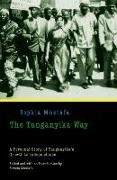Read more
The Tanganyika Way spans the political events of 1958?1961 that led to Tanganyika's independence from Britain. Sophia Mustafa participated in those events, and her account offers a rare insider's perspective of the political drama. She covers large international and national issues, which, coupled with the smaller personal details of her life, open a window into a time and an experience that are emblematic of an unique historical moment. We witness close-up one form of the decolonization that marked mid-twentieth century Africa. An unlikely set of circumstances led to Mustafa's political career, and as we learn about them we also meet the first generation of politicians who helped shape the nascent nation of Tanzania, including Julius Nyerere, one of Africa's most respected and cherished leaders. This re-issue is accompanied by rare photographs and a series of short essays that collectively offer historical, familial, and political contexts of both the author and her work. They include reminiscences by friends, spanning generations and geographies, inquiries by scholars theorizing "transnational subjectivity," feminist readings of Tanzania's early years, and the complex of diaspora/postcoloniality embedded in Sophia Mustafa's unusual biography. Edited and introduced by Fawzia Mustafa. Includes critical essays by Susan A Berger, Marjorie Mbilinyi & Ulla Vuorela.
About the author
Sophia Mustafa (1922-2005) was a writer and political activist of high acclaim. She was one of Tanzania's first women members of parliament. Of Kashmiri Indian origin, she grew up and lived in East Africa, where she was active in developing literacy, libraries, and newspapers in rural areas. She later moved to Canada, where she took on the career of a novelist, publishing In the Shadow of Kirinyaga. Her body of published work includes four books of poetry, three collections of short stories and several award-winning nonfiction works on Caribbean culture.

